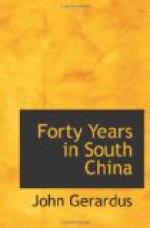foreigners to live on the first floor. We always
live above stairs. Therefore I have rooms in
the lower part of my house unoccupied. Khi asked
me if he might sleep in one of these rooms. I
of course consented. He had no bed or bedding.
I had some empty boxes in the room. He put these
together, and laid some straw and a straw mat on them
for his bed. After he was discharged by the mason,
he endeavored to make a living by carrying potatoes
about the street for sale. His profits were from
two to four cents a day. He made no complaint.
He lived on potatoes. Winter came on; he had
no means of buying clothing, or better food. The
consequence was that he became ill. The room
in which he slept was directly under my study.
Almost every night I would hear his voice engaged in
prayer, before he retired to his straw. Sometimes
he would pray for a long, long time. The first
thing in the morning again I would hear his voice in
prayer. I knew that he was destitute, but as
he never complained, I knew not how great his destitution
was, and did not dare to help him lest it would throw
out inducements for others to profess Christianity.
We are continually compelled to guard against this
danger. Many of these poor people would profess
Christianity for the sake of a living. One Sabbath
evening I heard his voice in prayer, much earlier
than usual, and therefore it attracted particular
attention. Presently word came to me that Khi
was ill. I went down to see him. It made
my heart bleed to see a fellow-creature in such destitution,
one, moreover, who I hoped was a brother in Christ
Jesus. I had had no idea that his destitution
was so great. He seemed to be suffering under
a severe attack of colic. On inquiry as to how
he usually fared, I did not wonder that he was ill.
I gave him a little medicine, took means to get him
warm and he was soon relieved.
“I then had some good food prepared for him.
I was peculiarly struck with the meekness and patience
wherewith he bore his sufferings. There was not
a murmuring word from his lips, but many words of an
opposite character. The next day I called him
into my study to give him a little money with which
to buy clothing and food. But I had great difficulty
in persuading him to take it. He said his sufferings
were of no consequence. They were much less than
he deserved. The sufferings of this world were
all only for a short time. They were sent upon
us to teach us not to love the world. Much more
he said to this effect. I had to call upon one
of the native converts to intercede with him, before
he would take the money. But I must not dwell
on this subject longer. From what I have said
about our missionary work, you will understand why
the missionary loves his work and why he would not
leave it for any other work, unless duty compels him.”
“He is only A beggar.”
Nov. 27, 1852. To the Sunday-school of the Reformed
Church at Bound Brook, New Jersey.




